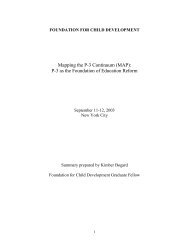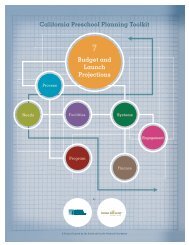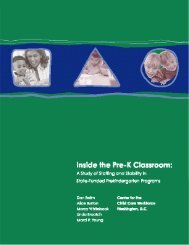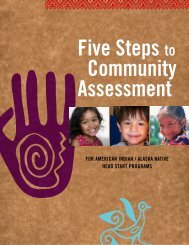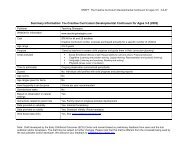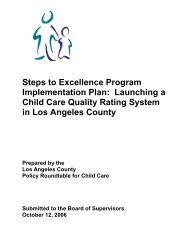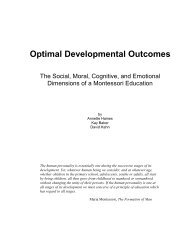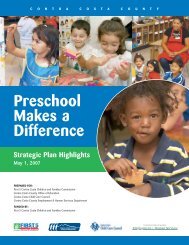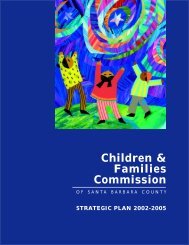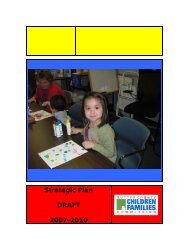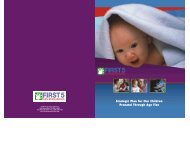Download this file - Plan4Preschool
Download this file - Plan4Preschool
Download this file - Plan4Preschool
You also want an ePaper? Increase the reach of your titles
YUMPU automatically turns print PDFs into web optimized ePapers that Google loves.
counseling teams can design, coordinate, implement, manage, and evaluate their<br />
programs for students’ success. It provides a framework for the program<br />
components that includes the school counselor’s role in implementation and the<br />
underlying philosophies of leadership, advocacy, and systemic change.<br />
• The National Standards for School Counseling Programs, developed by the<br />
American School Counselor Association, assists school counselors, counselor<br />
educators, and school leaders in developing comprehensive school counseling<br />
and guidance programs. The standards will also assist school districts in<br />
developing methods for evaluating the effectiveness of their comprehensive<br />
school counseling programs.<br />
• The Tenth-Grade Counseling Program (EC sections 48431.6 and 48431.7)<br />
requires school districts receiving certain funds to provide a systematic review of<br />
each student’s academic progress and provide counseling regarding educational<br />
options available during the final two years of high school. The purpose of the<br />
program is to provide a checkpoint for assessing student progress toward meeting<br />
graduation requirements and to broaden the educational and career options for<br />
students. It is also intended to give priority for counseling to students who are not<br />
progressing satisfactorily toward graduation or who are not motivated to set<br />
educational and career goals appropriate to their ability.<br />
This program is included in Assembly Bill 825, the Pupil Retention Block Grant,<br />
which combines eight separate appropriations in the Budget Act of 2004. This bill<br />
took effect on July 1, 2005.<br />
Signed into law in 2006, AB 1802 authorized $200 million to augment counseling<br />
services to all students in grades seven to twelve inclusive. In addition, the law provides<br />
for additional counseling services to those students in grades seven to twelve who are<br />
far below basic achievement on the English or mathematics portion of the California<br />
Standards Tests, in jeopardy of not graduating from high school, or who have not<br />
passed one or both parts of the California High School Exit Examination (CAHSEE).<br />
This is the largest single allotment of money ever awarded to counselors in the State of<br />
California.<br />
The California Results-Based School Counseling and Student Support Guidelines were<br />
written by the staff of the Counseling, Student Support, and Service-Learning Office and<br />
are scheduled for publication in the spring of 2007. This is the first update to the original<br />
publication in 25 years. The guidelines use the framework of the American School<br />
Counselor Association (ASCA), National Model combined with specific information to<br />
address the unique population of California. This document will provide guidance to<br />
school counselors who want to improve existing school counseling programs or want to<br />
implement a new school counseling program.<br />
For more information regarding school counseling programs, contact<br />
George Montgomery, Consultant, Counseling, Student Support, and Service-Learning<br />
Office, at (916) 319-0540 or by e-mail at gmontgomery@cde.ca.gov. Additional<br />
information is also available on the Counseling and Student Support Web site at<br />
http://www.cde.ca.gov/ls/cg.<br />
74



